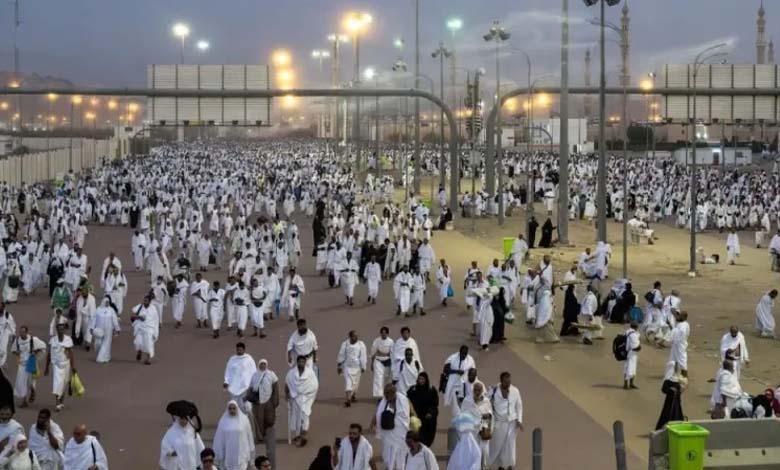Houthis Use Pilgrims as Political Blackmail

The Houthis use arbitrary arrests and enforced disappearances as a political tool while Yemenis living under their rule lack the most basic essential needs.
The Minister of Religious Endowments and Guidance in the internationally recognized Yemeni government, Mohammed bin Aida Shabiba, accused the Houthi group of detaining planes at Sanaa airport and preventing them from taking off to Jeddah to repatriate Yemeni pilgrims, which seems to be a new means of pressure and blackmail to gain political advantages. This adds to other practices documented by Human Rights Watch, confirming that the Houthis have arrested dozens of people since the end of May, including United Nations employees and NGO workers operating in their controlled areas.
Shabiba wrote on his account on the “X” platform that “the Houthis are holding four planes at Sanaa International Airport and preventing them from returning to Jeddah to transport our country’s pilgrims who want to return to Sanaa.” He urged the pilgrims to “stay in their accommodations until the planes hijacked by the Houthis return.” The agreement between the Yemeni Ministry of Religious Endowments and the Saudi authorities allowed about 12,400 Yemeni pilgrims to travel by air via Yemenia Airways from five airports, including Sanaa, Seiyun, Al Riyan, and Al Ghaydah. According to Saudi authorities, 1.8 million pilgrims performed the Hajj this year. Observers say the Houthis use any means to blackmail and pressure the legitimate government and Saudi authorities to achieve political gains.
Last month, Shabiba accused the Houthi group, classified on the U.S. terrorism list, of continuing “their arbitrary practices against our country’s pilgrims heading to the Sacred House of Allah, imposing absurd procedures and many obstacles to blackmail Hajj and Umrah agencies under their control and extorting pilgrims’ money.”
As usual, the Houthis responded by accusing Saudi Arabia of imposing “many obstacles and difficulties… and changing the agreed-upon air transport plans, reducing the number of passengers and flights allocated to the Republic of Yemen, which will lead to significant difficulties and obstacles for the transfer of pilgrims,” according to the Houthi government’s Ministry of Guidance and Hajj and Umrah Affairs.
However, international organizations confirm that the Houthis practice all kinds of violations, including against employees working for them. Human Rights Watch stated that Houthi security forces had arbitrarily detained and forcibly disappeared dozens of people since May 31, 2024, including at least 13 United Nations employees and many NGO workers operating in Houthi-controlled areas. The arbitrary arrests are presumably based on the detainees’ current or previous work.
The Houthis carried out these arbitrary arrests while hunger and thirst are widespread across Yemen, including in areas under their control. During the recent cholera outbreak, which the Houthis concealed for several months, according to an ongoing Human Rights Watch investigation.
Niko Jafarnia, a researcher on Yemen and Bahrain at the organization, said, “The Houthis use arbitrary arrests and enforced disappearances as a political tool at a time when people living in their territory lack even the most basic essential needs. The Houthis must release all these people immediately, many of whom have devoted their careers to improving their country.”
The organization spoke to 20 people with knowledge of the arrests and four Yemeni analysts. Their identities were concealed for their safety as they feared retaliation. The organization also gathered documents, videos, social media posts, media reports, audio recordings, and other materials related to the arrests.
It concluded that Houthi forces did not provide arrest warrants during the arrests, and the authorities refused to inform families of the detainees’ whereabouts, meaning these actions amounted to enforced disappearances. The forces detained these individuals in unknown locations, without allowing them to contact their lawyers or families. On June 19, the organization added that Houthi authorities have a long history of making dubious accusations against detainees, including espionage.
-
The Houthis carry out the largest attack in the Red Sea since the Gaza war
-
The Houthis and the Yemeni Muslim Brotherhood visit Hamas Office in Sanaa… What are their real objectives?
Since June 10, Houthi authorities have released a series of videos and coordinated social media posts through the Houthi-affiliated “Al-Masirah” TV channel and related platforms. The videos show ten Yemeni men detained between 2021 and 2023. Most of them were held in unknown locations.
The videos show the men confessing that they were spying for the United States and Israel, but there is a significant risk that these confessions were extracted under duress. The organization has previously documented the Houthis‘ use of torture to obtain confessions. It noted that publishing confession videos undermines the right to a fair trial and lacks credibility.
-
The Houthis plan to obliterate the identity of the old city of Sanaa… and UNESCO intervenes
-
Wadah Bin Attiya: What the Houthis are practicing is blatant piracy, exposed and outstanding terrorist acts
Although the Houthis have not stated whether the current arrests are linked to the videos and their related statements about uncovering a “spy network,” sources, including analysts, said they feared the Houthis were trying to portray the recently detained individuals as spies.
Yemeni analysts also pointed to political motives behind the arrests.












